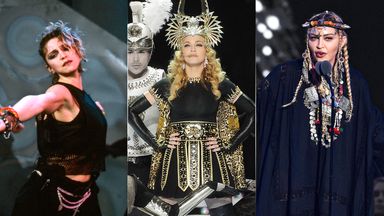Madonna: How the Queen Of Pop behind Like A Virgin defined an era
As the singer’s signature tune turns 40, we look back at her past four decades in the spotlight, and the Queen of Pop’s unrivalled ability to reinvent herself and redefine her career at every turn.

Madonna’s Like A Virgin, the catchy number credited with encouraging women across the world to embrace their sexuality, has turned 40.
Her first US number-one, the track would go on to become her signature song, and 20 years later would provide a viral moment with Britney Spears at the MTV VMAs.
As we mark the milestone, we take a look back at the Queen Of Pop and her many reinventions over the years.
Who’s That Girl?
The Queen Of Pop, a Material Girl, a gay icon and a self-proclaimed “warrior” – Madonna is many things to many people.
Rihanna, Britney Spears, Katy Perry and Lady Gaga have all recognised the 66-year-old star’s influence on their careers, with Beyonce – a woman who has more Grammy nominations than anyone else in the world – hailing her a “masterpiece genius”.
She’s had more top 10 hits than Elvis, sung a Bond song, met Queen Elizabeth and performed at the Super Bowl half-time show. There’s even part of an academic discipline devoted to her – Madonna studies.
This year and last – after recovering from a stint in intensive care – she toured the world, selling more than a million tickets and grossing over $220m (£170m).
Her impact on the world has transcended the music industry. She has become one of the most recognisable faces of the 20th and 21st centuries – a post-modern icon playing the game by her own rules.
The best-selling female recording artist of all time, her sparkling four-decade career has earned her multiple awards and a place in the Rock & Roll Hall of Fame.
A master of reinvention, those of a certain age who have followed her over the years have been treated to numerous musical styles, as well as a succession of colourful personas.
Hits have ranged from her early pop tunes Into The Groove and True Blue, to the electronic dance beats in Ray Of Light, a country vibe in Don’t Tell Me and classic musical theatre in Don’t Cry For Me Argentina.
As for her physical makeovers, they have spanned the fingerless gloves and lacey look of her first number one, Like A Virgin, aged just 26, to the much-imitated Jean Paul Gaultier cone bra and scraped back hair of her Blonde Ambition world tour six years later.
Then there was the Earth goddess hippie look for her Ray Of Light album, her first as a mother, and then the Farrah Fawcett flip hair and leotard look to usher in her 50s.
With each different phase as distinctive as the next – and each one signalling a mini-comeback of sorts – her skill at keeping herself in the headlines means she’s rarely been out of the public consciousness over the last 44 years.
Dominating the cultural conversation
Always aware of the selling power of controversy, many moments in her career have dominated the cultural conversation over the decades.
In 1989 her Like A Prayer video scandalised many by featuring burning crosses, bleeding stigmata and a sexually active black saint. The Vatican condemned it and Pepsi cancelled a sponsorship deal. The resulting outcry helped the single become a massive hit and her seventh number one on the Hot 100.
In 2003 after opening the MTV VMAs with a performance of Like A Virgin, an on-stage snog with Britney Spears went viral – two years before YouTube came into existence.
And when during a performance in 2015 a wardrobe malfunction saw her pulled backwards down a flight of stairs live on stage, she picked herself up and carried on. She later denied the fall – which left her with whiplash – was a publicity stunt.
Singer, actress, writer and businesswoman
Of course, she’s got another string to her bow – she’s not just a singer, but also an actress. While many have maligned her acting ability, she has starred in over 20 feature films – including the Oscar-winning 1996 drama Evita – as well as numerous TV shows and commercials.
She’s starred opposite industry heavyweights including Rosanna Arquette (Desperately Seeking Susan); Antonio Banderas (Evita) and Warren Beatty (Dick Tracy). And she’s also performed on Broadway and the West End.
Plus, she has literature – her 1992 coffee table book Sex, featuring softcore pornography and sadomasochism – topped the New York Times best-seller list for three weeks, selling more than 150,000 copies on its first day, becoming the fastest-selling coffee table book of all time.
Considered a bold post-feminist work – and featuring a naked Madonna to boot – it remains one of the most in-demand out-of-print publications of all time.
When it comes to managing her own destiny, Madonna has led the charge from the get-go, writing and producing the majority of her own music from early on in her career, succeeding in moulding and steering her career her way.
A businesswoman as well as an artist, Forbes has named her the top-earning female musician 11 times, and estimates her to be worth $580m (£457m) as of 2023.
In 2013 she launched her own skincare range – MDNA Skin.
Be the first to get Breaking News
Install the Sky News app for free


‘Control freak’
Unsurprisingly, as a woman at the top of her game and in financial control of her art, her business acumen has led to the Grammy, Brit and Ivor Novello-winning singer being labelled a “control freak”.
However, Madonna insists she values collaboration, saying in a 2012 interview: “I can’t work on my own… I need to hear what people think all the time.”
Battling her way in the industry years before the #MeToo movement, she reportedly rejected the advances of Harvey Weinstein (whose then company Miramax produced her 1991 documentary Truth Or Dare) telling him: “Get away from me, you smell like a f****** ashtray.”
Her more recent criticism of ageism and sexism in both the music industry and society has received widespread media coverage.
So where did it all begin? The eldest girl of a Catholic family of six children, she was born Madonna Louise Ciccone in Michigan in August 1958.
She was named after her mother, whose death from breast cancer when she was aged just five left her bereft. This early loss resulted in Madonna rejecting the idea of having children for many years, saying she “associated motherhood with sacrifice, suffering and ultimately death”.
Dropping out of college, and moving to New York in 1978 to pursue a career in entertainment, the then 19-year-old Madonna was raped at knifepoint during her early days in the city.
She has since said she never reported it to police, fearing the humiliation.
Refusing to let the attack faze her, she found a series of jobs including at Dunkin’ Donuts and as a coat check girl, before segueing from a backing singer and dancer to a solo performer.
Multiple number one hits followed, across 14 studio albums. And as well as singing, she also plays the piano, guitar, ukulele and drums.
An early adopter of the hands-free headset microphone, the piece of kit has since been informally named in her honour, dubbed the “Madonna mic”.
Philanthropist, wife and mother
A woman who clearly knows the power of fame, she’s used it for good on many occasions.
In 1998 she set up the Ray Of Light Foundation – named after her seventh studio album – promoting peace, equal rights and education for all.
In 2006 she founded the non-profit organisation Raising Malawi, supporting orphans and vulnerable children, many of whom have been directly affected by HIV and AIDS.
And in 2014 she donated money to her hometown Detroit after the city declared itself bankrupt, and in 2020 – as COVID spread around the world – she donated $1m (£788,000) to the Bill & Melinda Gates Foundation to help find a vaccine.
As for her personal life, she’s been married twice. First, her notoriously fractious marriage to actor Sean Penn came to a close in 1989.
She then became an honorary Brit – buying a Wiltshire estate and a London pub and even adopting the accent – after wedding English film director Guy Ritchie. The couple split in 2008 after eight years of marriage.
She’s had many other well-documented relationships with stars – albeit some of them brief – including with Michael Jackson, Tupac, Vanilla Ice and Dennis Rodman.
Alongside her performance career, she is also mother to six children – Lourdes, 26, Rocco, 22 – both her birth-children – and David, 17, Mercy, 16, and twins Estere and Stella, 10, who were all adopted from Malawi.
Raised a Catholic, in the early 2000s her devotion to Kabbalah – a form of Eastern mysticism – led her to change her name to Esther, which means “star”.
‘I never quit, I never give in’
One constant in her career has been her ferocious work ethic. An exercise lover, she has at times worked out for five hours per day as well as following a strict macrobiotic diet. It’s a dedication which has allowed her to maintain a peak level of fitness and tour into her 60s.
So far, she’s completed 12 gruelling concert tours – many of them sold out – and two of those broke records.
Her Sticky & Sweet tour, which ran from August 2008 to September 2009, and her 60-date Confessions tour in 2006, both topped the most money grossed on tour by a female entertainer ($194m and $411m respectively).
However, her last few tours have been beset by illness, leaving her unable to satisfy her own brutal work ethic. Multiple dates of her 2019-2020 Madame X tour were called off due to “overwhelming pain”, with the star pictured walking with a cane and wearing knee braces.
Last year’s Celebration tour was delayed following a “serious bacterial infection”. The 80-date outing eventually picked up again in London in October 2023, before touring Europe and North America and wrapping with the biggest gig of her career on Copacabana Beach in Rio de Janeiro.
Madonna has previously called cancelling gigs a “punishment”, and at the time of her Madame X cancellations told fans that despite considering herself to be “a warrior” – adding “I never quit, I never give in” – she had been forced to stop performing “so that I don’t inflict further and irreversible damage to my body”.
Despite the setbacks, her record as the highest-grossing touring female performer of all time was only broken last year, when she was overtaken by Taylor Swift’s The Eras tour.
Perhaps the last word should go to Howard Kramer, the curatorial director of the Rock and Roll Hall of Fame, who said: “Madonna and the career she carved out for herself made possible virtually every other female pop singer to follow… She certainly raised the standards of all of them… She re-defined what the parameters were for female performers.”


